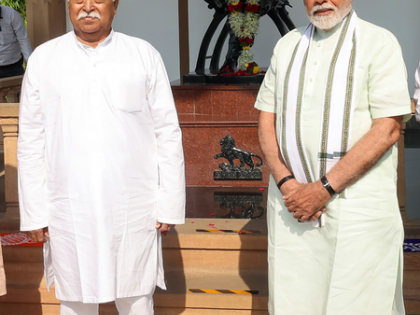RSS shares ideological alignment with BJP, not political (IANS Analysis)
By IANS | Updated: October 2, 2025 16:20 IST2025-10-02T16:18:44+5:302025-10-02T16:20:10+5:30
New Delhi, Oct 2 The Rashtriya Swayamsevak Sangh (RSS) commemorating the auspicious day of Dussehra this year was ...

RSS shares ideological alignment with BJP, not political (IANS Analysis)
New Delhi, Oct 2 The Rashtriya Swayamsevak Sangh (RSS) commemorating the auspicious day of Dussehra this year was more than an event marking its anniversary. But if anyone thought that Sarsanghchalak, or the chief of the organisation, Mohan Bhagwat would mark its centenary celebration with a long, winding speech, they were mistaken. Even for those looking for a direct political message to the government it was a let-down.
While addressing the Vijayadashami Utsav congregation in Nagpur, Mohan Bhagwat did mention political, diplomatic, and economic challenges. He also emphasised the need for national unity and self-reliance in his speech. He gave a call for caution against threats – internal and external – and highlighted the importance of sustainable development amid change in environment and natural calamities.
However, while the RSS has contributed a large number of leaders to the Bharatiya Janata Party (BJP), including Prime Minister Narendra Modi himself, it refrains from direct involvement in political matters.
According to a functionary close to the organisation, the root lay in an incident from the late 1940s, when there was a debate over the RSS diving into politics. There was a section that proposed direct participation in order to have a presence and a voice in the political spectrum.
However, Madhavrao Sadashivrao Golwalkar, known as “Guruji”, then at the helm of the Sangh, was strongly opposed to the move.
Golwalkar was the second Sarsanghachalak of the RSS from 1940-1973. He was of the opinion that if the organisation turned political, he would rather prefer to begin all over against by organising new “shakhas” and reaching out to the people with the aim and objectives as clearly laid out.
Politics, according to the Sangh, cannot bring the desired social change in society. As pointed out by the present Sarsanghchalak on Thursday, “social awareness and change in societal conduct are necessary for bringing about social change. Changes in society’s behaviour do not come through speeches or texts. We need to create active social awareness, and those undertaking this need to become living examples of change.”
In August-end, he had clarified that government and governance is with the Bharatiya Janata Party (BJP), “the RSS can only give suggestions”.
Though the RSS serves as the political party’s ideological backbone, where its senior functionaries serve as organisational secretaries at different levels of the party or frontal organisations, the Sangh refrains from direct involvement.
It is part of teachings from the early days. Till now, the Sangh has achieved just about 30 per cent of its goal, according to a functionary close to the organisation.
“We commemorate, we recount the tasks, it is not time to celebrate,” he added.
In simple terms, he explained, the ideal is to carry the nation to the pinnacle of glory, through organising the entire society, and not just be an organisation in the society. Perhaps the thought reflected in his speech, when the RSS chief pointed out on Thursday, “Therefore during the centenary year, the Sangh will attempt to ensure that its work of 'Vyakti Nirman' spreads across the country and the 'Panch Parivartan' programme, which aims to bring gradual changes in social conduct, is adopted by all sections of the society through the examples of Swayamsevaks.”
Thus, despite taking up issues related to terrorism, diplomacy, social changes, among others, there were no political advice made to the government of the day.
Disclaimer: This post has been auto-published from an agency feed without any modifications to the text and has not been reviewed by an editor
Open in app